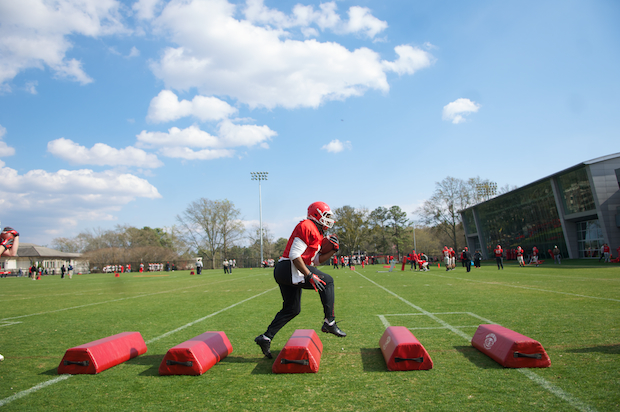
Yes, playing on a sports team teaches you a lot about playing that sport. But it also teaches you so much more.
As someone who has spent more than two thirds of their life playing some form of organized sport—whether it’s basketball, soccer, track and field, or cross country—I’m able to witness firsthand how drastically it can affect your life. Some sports skills (like how to shoot a free throw) aren’t super useful in everyday life, but if you’ve ever played a sport, there are so many skills that will always be with you—whether in everyday life, at the gym, in the relationships you build, or in the office. Here are some of the most helpful ways that sports can carry over into your work life, starting with the most obvious:
1. Teamwork
There is nothing better to teach you teamwork than—you guessed it: working with a team. In sports, if your team doesn’t work together as a whole, it’s almost impossible to succeed. Learning to both step up when you need to, and delegate when practical is essential in the office. Being selfish or not taking the team’s needs into consideration won’t get you far in sports, business, or life in general.
2. Communication
The best sports teams are constantly communicating. In a game, you are always talking to your teammates, telling them where the other team’s players are moving, where they should watch or cover, or which play to run.
There is no such thing as too much communication in sports: when things get hectic, communication helps everyone stay calm and organized. In the workspace, effective communication is what helps keep things running smoothly, and reminds coworkers that they’re part of a team and that their input is important.
3. Pushing through the tough stuff
No one likes doing sprints at the end of basketball practice. But if you want to be able to run up and down the court for an entire game without dropping to the ground with exhaustion, you need to be in shape.
In the office, not everything is fun and games. But in order to become the best you can be, sometimes you have to do tasks that are challenging or (possibly worse) mundane, but necessary.
4. Handling pressure
On a similar note, sports involve not only pushing through challenging situations, but high-pressure ones as well. If you’re facing a full-court press in basketball, or are on the free throw line at the end of a close game, being able to have a level head in high-pressure situations is an incredible skill to have. In the office, this could apply to everything from making important financial decisions to public speaking.
5. Leading by positive vs. negative feedback
No one likes the teammate or coach who yells at people constantly when mistakes are made. While constructive critiques are important and necessary, it is also just as important to give positive feedback when things are going well.
This builds morale, gives people confidence, and if people’s accomplishments are recognized, they’ll be more willing (and happy) to work hard for the benefit of the team. This leads to the next point:
6. Commitment and accountability
When you are part of a team, you are going to do everything in your power to not let your team down. This means showing up on time for practice (or work), and showing up ready to games (or meetings). And if you can’t do these things, it’ll be for a good reason that you’ll be sure to communicate with the team.
7. Improvisation and problem-solving
In a game, if a play or tactic isn’t working, it’s time to problem solve and make changes to your strategy, instead of trying the same thing over and over.
The same applies in the office—customers, trends, and technology are always changing, and it is imperative to adapt to these changes. Being able to evaluate the situation and change tactics is a huge key to both work and life.
8. Optimism
Lastly, it’s impossible to succeed on a sports team without optimism. Sometimes, your team will lose. It’s going to happen. But instead of hanging your head and giving up all hope, it’s essential to bounce back, work harder, and take on the next challenge with even more fervor. Without optimism, we don’t give ourselves anything to work for or look forward to.
Whether or not anything discouraging has happened in the office, it’s so important to be optimistic. Entrepreneurs need to be optimistic that their new business will succeed. Sales representatives need to be optimistic that they’ll make the sale. Again, without optimism, we don’t give ourselves anything to work for or look forward to.
If you’ve ever played any kind of organized sport, I’m sure you’ll be able to relate to these skills. Sports are not only fun, but are one of the best life coaches you can find. Maybe that company softball team isn’t the worst idea, after all…







